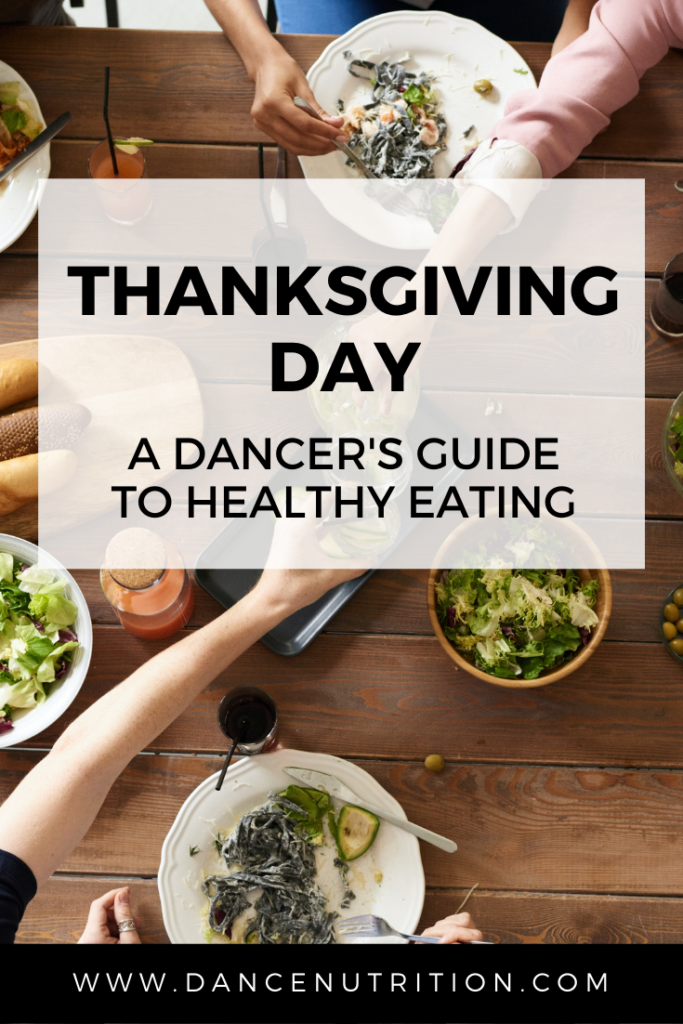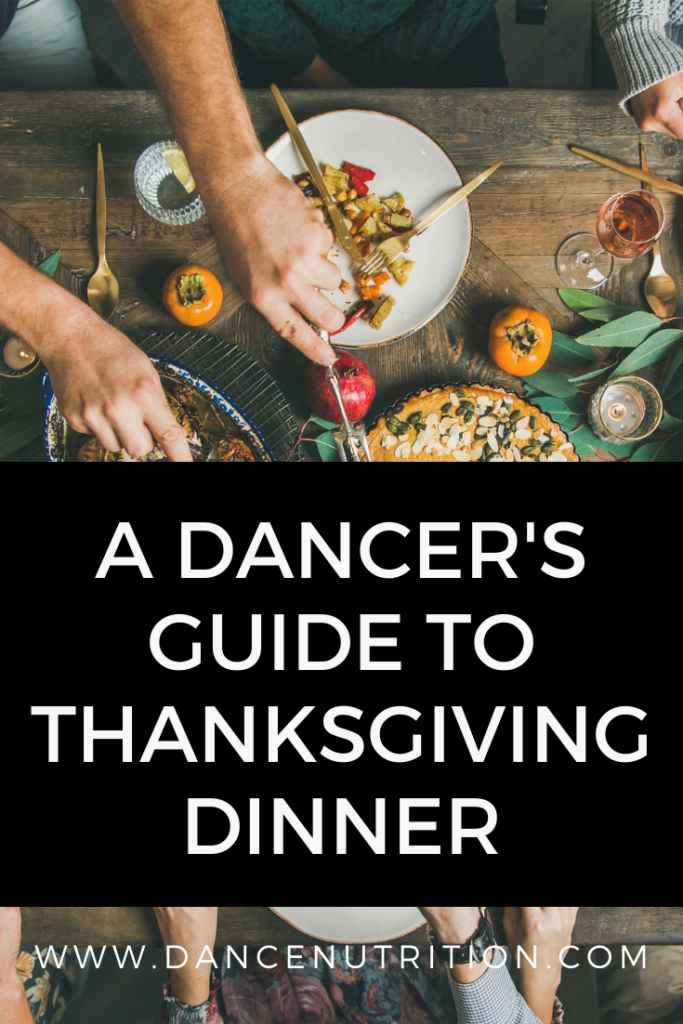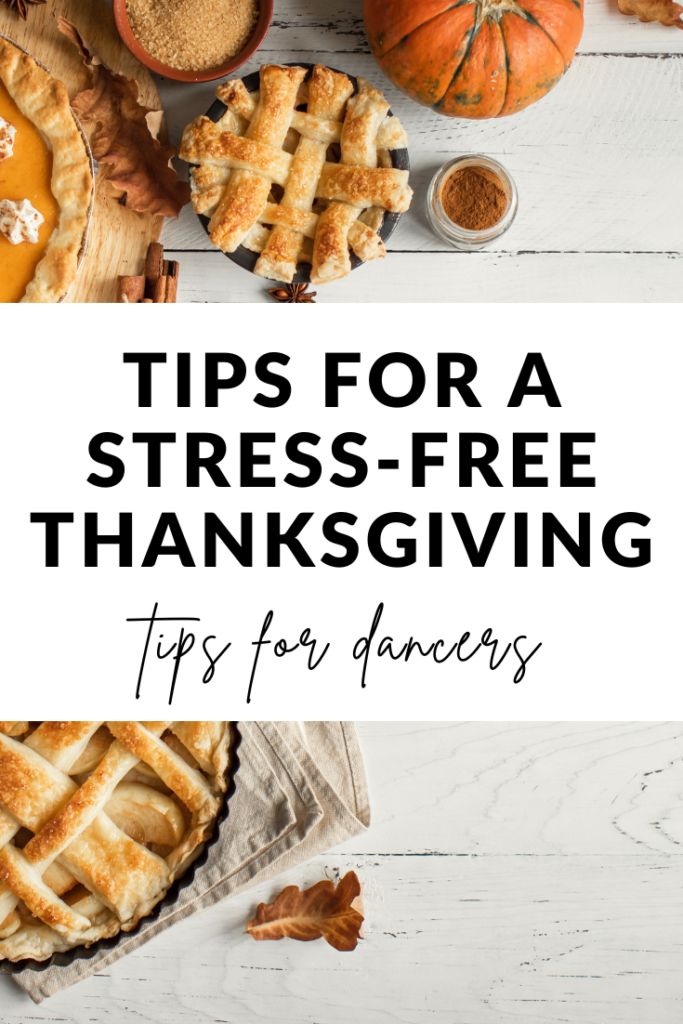There was a time when I’d spend weeks before a holiday Googling tips about how to NOT “over”-eat. I’d map a plan for myself in an attempt to strengthen my “willpower,” but it never worked. I’d end up “throwing in the towel.” I’d feel out of control, uncomfortable, bloated, and discouraged. Then I’d set another (unrealistic) goal for myself: never again.
It took years to shift my holiday experience from stress to pleasure and now, as a Registered Dietitian for dancers, I’m determined to help you do the same. Without resorting to this all-or-nothing mentality, you can navigate your holiday free from stress, anxiety, and food guilt. In this blog post, we’ll formulate solutions to the most common food- and body- struggles that dancers experience around holiday meals.
Why are holidays like Thanksgiving hard for dancers?
Like most holidays, Thanksgiving is centered around food (and sometimes, exercise gets thrown into the mix). Uprooted schedules from studio closures and vacations to larger (and oftentimes, richer) meals can leave dancers struggling to identify structure when much of their normal routine feels off. For dancers who are simultaneously healing from disordered eating, family meals can also be a source of potentially triggering conversations about dieting and weight. Even activities like a Turkey Trot can spark anxieties.
5 Tips for Balanced Eating on Thanksgiving:
Despite these challenges, holidays like Thanksgiving can be a joyful and fulfilling time for dancers. Understanding your relationship with food, along with learning about how nutrition can support you and not limit you, will be elemental. To get there, let’s uncover the most common challenges faced by dancers, and how to navigate through them.
Challenge #1: You’re insanely anxious about the food
Holiday meals, particularly for Thanksgiving, are larger than the norm. In addition to this is the reality of new foods that might be richer and feel heavier when compared to those incorporated into your daily eating routine.
Overwhelming thoughts about the big meal could be a sign of deprivation, whether it be intentional (such as from dieting, overexercising, and/or following strict food rules) or unintentional (such as from food insecurity).
Thanksgiving Day Solution:
Take a mental inventory: are you stressed about the amount of food that will be served? The types of food? Both? Do you feel a lack of self-trust in your ability to stop eating when feeling full? Are you worried about not knowing the ingredients in the dishes served? Explore reasons for your food anxiety and make space for permission— allow yourself to be challenged by the realities of the holiday meal. It might be bigger, it might be more indulgent. There is nothing inherently wrong with this, nor is there anything wrong with eating these more indulgent foods.
Food Flexibility allows dancers to adapt to an ever-changing food environment. This is especially important on Turkey Day! Remember: this meal equates to less than 0.005% of your year’s food intake! Regardless, this doesn’t mean that your holiday meal needs to be a “cheat” meal (heads up: when eating intuitively, there’s nothing to “cheat” on). To improve your food flexibility, check out these additional resources:
- Start here to improve your food flexibility.
- Read this to build a mindset of permission.
- Then, begin breaking your food rules with these step-by-step tips.
Challenge #2: You’re dreading food and body comments
There’s no doubt that diet culture infiltrates most gatherings around food. But while food- and body- comments might come from well-meaning relatives, they can be very triggering to dancers.
Thanksgiving Day Solution:
If someone brings up triggering topics, like they’re latest diet or weight loss efforts, gracefully redirect the conversation to more positive and neutral subjects. Share your excitement about dance, your recent performances, or any other interests you have. Steering away from weight-centric discussions can help create a more supportive environment.
But sometimes, this isn’t enough— it might be necessary to set boundaries with family members who consistently engage in conversations that make you feel uncomfortable. Politely but firmly express your desire to focus on positive and inclusive topics, emphasizing the importance of enjoying the holiday together. You can explain that you’re currently working on your relationship with food and listening to your body’s needs.
If you’re feeling overwhelmed, it might not be the best time for you to be the all-star anti-diet advocate you’re working to become. Rather than debating the science behind why dieting doesn’t work, consider a more compassionate approach. Empower others by sharing your experience with healing from diet culture. If your family is still not budging, politely excuse yourself from the table— text a friend, grab some tea… whatever it takes! Here are more articles that dive into triggering commentary and how to navigate it.
Challenge #3: You’re planning to “save up” or “burn off” the meal
A common misconception about eating on Thanksgiving is to avoid food throughout the day (or days) leading up to the big meal in hopes of “allowing” the richer holiday foods. This, along with planning extra workouts to “burn the calories,” can easily increase your vulnerability to compensatory eating at the meal. In other words, you’re less likely to access mindful eating techniques, and more likely to eat past a comfortable fullness.
Thanksgiving Day Solution:
As long as it’s not restrictive, stick to your usual eating routine. This might resemble regularly planned meals and snacks every 2-4 hours during the time leading up to the big meal. Perhaps you start the day with eggs and toast, or a yogurt parfait. If accessible, add fibrous additions like whole grain cereal and greens to help with nourishment, digestion, and even satisfaction. If the big meal is planned for later in the day, aim to squeeze in a balanced lunch. If your holiday meal is early, try to include a filling snack before bed.
The goal is to enter the holiday meal with a sense of comfortable hunger, not rebound hunger (more on this here). Another bonus? You’ll experience more ease with mindful eating— eating foods that satisfy you and skipping those that don’t. Check out these helpful articles to guide you through:
- Listening To Hunger Cues
- How To Stop Eating When Full
- Mindful Eating Practices for Dancers
- Guilt-free eating on holidays (plus journaling prompts to get you through)
In regards to your dancing and workouts, most studios are closed on holiday. Take that as a sign that you too can take the day off! Mindful movement, like yoga or pilates, can help clear your mind if needed. But don’t look to “burn the calories” you plan to eat later on.
Challenge #4: You’re trying to “healthify” Grandma’s recipes
When it comes to the food, are you looking to create lighter versions of past loves? Here’s the deal: you can eat the regular versions without destroying your health and performance goals. Also, you don’t need to add extra veggies or swap ingredients with their “healthier” counterparts. Sure, you can totally create a nutrient-dense dish that you love and serve it alongside dinner. But realize that we deserve to enjoy BOTH those nutrient-dense options and those not-so-healthy options.
Thanksgiving Day Solution:
Enjoy the real deal. It’s crucial to creating a satisfying experience for yourself. Ask yourself: which dishes are your absolute favorites? Which options bring nostalgic happiness to your plate? Maybe it’s your grandmother’s stuffing or your father’s homemade apple pie? Forgo items that don’t appeal to you. Enjoy those you love in a mindful, present manner. Consider the tastes, textures, and mouthfeel of the foods. You’d be surprised how this slows down your eating, allowing you to feel your fullness cues. Here’s an article that teaches you more about satisfaction and the important role it plays in your meals.
Challenge #5: Your expectations are unrealistic
There is no “perfect” way to eat… even when it comes to intuitive eating. When we simplify intuitive eating as “eating when hungry and stopping when full,” we turn it into another restrictive diet.
Thanksgiving Day Solution:
Get comfortable with a few holiday meal facts: you’re likely to eat foods that might not be “nutrient-dense” or “healthy.” You’re likely to sit on your couch for most of the day. You’re even likely to eat past your fullness cues. Just remember that this is ALL normal and ALL okay. This one meal with never make or break your performance or health. Consider it an experience, even if that experience involves the discomfort of feeling too full. This sensation will pass.
Emphasize Gratitude
And finally, remember that eating doesn’t have to be the only activity you do on Thanksgiving. Instead of making food the main star of your meal, consider other aspects to enjoy: catching up with family, spending time with friends, and/or planning new holiday recipes.
Shift the focus of the holiday to gratitude and celebration. Take time to reflect on the positive aspects of your life, express gratitude for your accomplishments, and celebrate the joy of spending time with loved ones. Bottom line: you deserve to enjoy your holiday! If you’re looking for additional tips, I discuss some more in this blog post!





